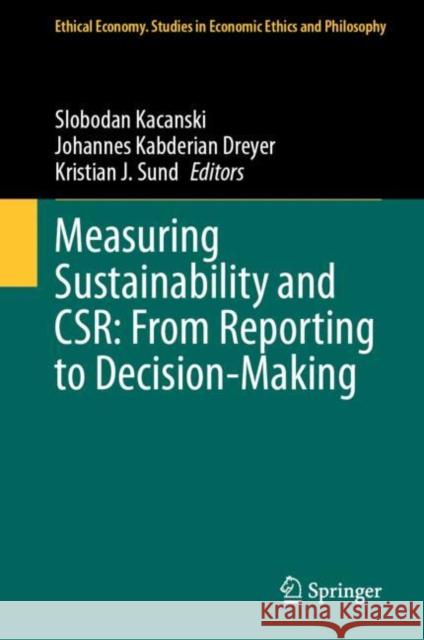Measuring Sustainability and CSR: From Reporting to Decision-Making » książka
Measuring Sustainability and CSR: From Reporting to Decision-Making
ISBN-13: 9783031269585 / Angielski / Twarda / 2023
Measuring Sustainability and CSR: From Reporting to Decision-Making
ISBN-13: 9783031269585 / Angielski / Twarda / 2023
(netto: 624,92 VAT: 5%)
Najniższa cena z 30 dni: 539,74
ok. 16-18 dni roboczych.
Darmowa dostawa!
This book discusses reliability and other related issues, such as reporting and decision-making, pertinent to sustainability and corporate responsibility reporting practices. Investors, governments, and NGOs expect businesses to report their environmental and social performance. This information is used to legislate, regulate industries, and guide the investment of billions of dollars through pensions and mutual funds. But can we trust these measurements? In order to answer this question, the editors and contributors, all academic thought leaders from a variety of fields, offer a set of reflections on problems that various stakeholders might be exposed to. These problems are mainly due to a lack of standardized reporting practices and guidelines, and inconsistencies in measurements used for the valuation of corporate sustainability performance indicators. This book is of great interest to students, scholars, and stakeholders to help comprehend the importance of accounting on sustainability practices for decision-making and measures therein, but also the reliability risks involved in these measurements. Thus, it moves away from simply pushing for more sustainability reporting towards a more critical discussion of measurement issues and potential consequences of the aforementioned problems to different fields such as finance, marketing, or strategy.
This book discusses reliability and other related issues, such as reporting and decision-making, pertinent to sustainability and corporate responsibility reporting practices. Investors, governments, and NGOs expect businesses to report their environmental and social performance. This information is used to legislate, regulate industries, and guide the investment of billions of dollars through pensions and mutual funds. But can we trust these measurements? In order to answer this question, the editors and contributors, all academic thought leaders from a variety of fields, offer a set of reflections on problems that various stakeholders might be exposed to. These problems are mainly due to a lack of standardized reporting practices and guidelines, and inconsistencies in measurements used for the valuation of corporate sustainability performance indicators. This book is of great interest to students, scholars, and stakeholders to help comprehend the importance of accounting on sustainability practices for decision-making and measures therein, but also the reliability risks involved in these measurements. Thus, it moves away from simply pushing for more sustainability reporting towards a more critical discussion of measurement issues and potential consequences of the aforementioned problems to different fields such as finance, marketing, or strategy.











